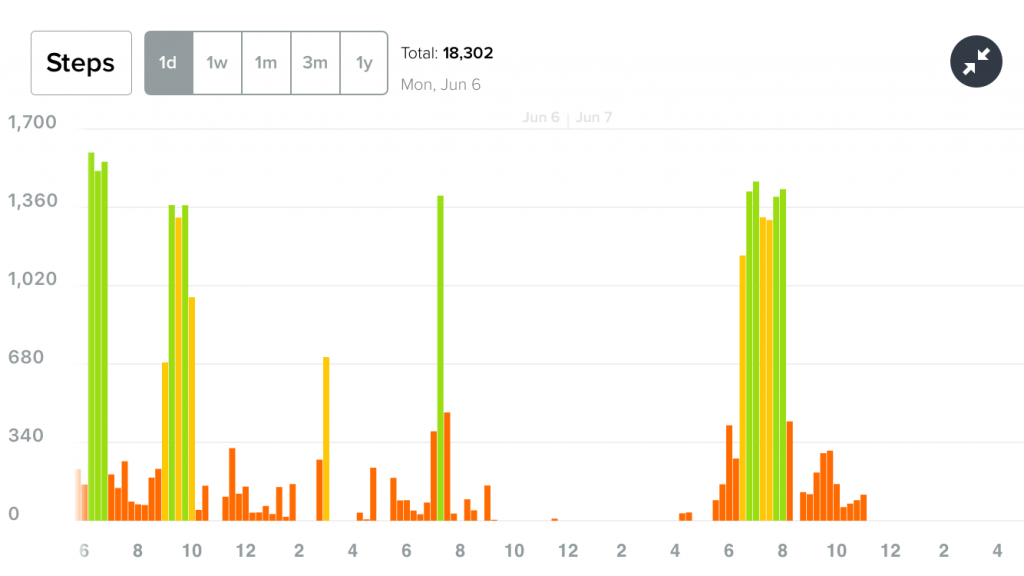I’ve been reading a lot of news stories lately about the accuracy of fitness trackers, which has been debate in the fitness community ever since I started in fitness over 10 years ago.
The calorie readouts on the treadmills, ellipticals, and heart rate monitors were all that were available, back then.
Soon after I started personal training, the bodybugg was introduced (and if you’re a long time reader, you know that I loved my bodybugg sooooo much that I became a reseller).
It was expensive, but it was a great tool, and I finally felt like it offered the missing side of the equation to my food logging; you can log your food all you want, but unless you know how many calories you’re burning, you don’t have the full picture. Even if you are logging your food, how do you know if you’re consuming too many? Or not enough?
I became obsessed with my bodybugg. I wore it All.The.TIME! <- seriously – I had a tan line and an indent in my arm from where it was strapped on.

Enter the Fitbit. It was small, discreet, inexpensive, and no monthly fees. Immediately, the criticism was that it wasn’t accurate.
But how do you know?
How do you know that one device is more accurate than another if you don’t have any way of knowing what your body is doing in the first place?
Calories In versus Calories Out
Calories in versus calories out just means that if you burn the same number of calories that you eat, you’ll maintain your weight. Eat less than you burn, and you’ll lose; Eat more than you burn and you’ll gain weight.
The calories in versus calories out model is flawed. I saw it on myself when I was using the bodybugg.
Yes. If you have a significant amount of weight to lose, move more than you eat, and you will lose bodyfat.
BUT when you get down to the vanity pounds (20 lbs or fewer), that model begins to break down. Think about it. If I created a 100 calorie a day deficit for the rest of my life, I would essentially whittle away to 0 lbs without some metabolic intervention. You need to turn your attention to quality of food and quality of exercise.
Also good to note, a 500 calorie deficit while burning 3000 calories a day is going to produce very different results than the same deficit while burning 1500 calories. Eating more is going to give your body more nutrients, and allow it to function better.
When eating fewer than 1200 calories a day, it’s going go be tough to give your body all of the vitamins and minerals it needs to function at it’s best.
Moving more is going to allow you to work treats into your daily life.
And ‘moving more’ does not mean that you need to exercise like a crazy person.
It simply means, move.
More often.
Don’t sit as much.
Go for a walk.
Which brings me back to my fitness tracker.
What fitness trackers do
Okay – so let’s assume that no fitness tracker out there is 100% accurate. Why use them at all?
Awareness. That’s why.
The thing that food logs and fitness trackers bring to the party is that they create awareness.
‘Oh! A serving size of peanut butter is the size of a golf ball? and that has about 200 calories? Interesting.
If I have 2 servings of peanut butter on my sandwich (because who the hell only outs 2 tablespoons of peanut butter on a slice of bread?) I need to walk for an additional 30 minutes. Huh. Is that worth it to me?’
OR
Looking at the graph of how much I moved in the day,
‘There’s where I sat on my butt, surfing Facebook. And there’s where I went for a walk. That’s where I went to the grocery store, and I really didn’t realize how much I moved when I was making dinner!’
So, I think that fitness trackers offer a lot.

What fitness trackers will NEVER be able to do
But if you’re looking for razor sharp accuracy, I don’t think that we’re ever going to get that, because the body is so complex. There are a whole host of body and hormonal functions and that influence if/how our body uses and stores energy.
I think that we can all agree that stress and sleep don’t have or burn any calories. But their influence on our body’s ability to function properly is HUGE.
And then there’s digestion. How many of the calories that you eat do you actually metabolize? It’s not always 100%.
Much more goes into having a metabolism that runs smoothly than what we eat, drink and how much we move. Even if your body is burning 3000 calories a day (quantifiable by a fitness tracker), if you’re not managing your stress or sleep, you aren’t going to lose 1 lb – even if your diet is on point and you have the proper deficit.
And those are things that a tracker just can’t report.
After a really long break, I have started wearing my Fitbit again. I stopped using it because I became a little too obsessive over it.
My attitude towards it now is different. I like it for it’s accountability. I like it that it gets me up & moving if I haven’t moved in a while, and I like it’s sleep function.
So, if you’re looking for the magic pill in weight loss, fitness trackers aren’t it. They won’t stop you from eating a whole pint of ice-cream after a fight with your boss. And even if you went out & tried to exercise all of those calories off, the body just doesn’t work that way. You can’t out exercise a bad diet.
But if you’re looking for a tool that could provide some motivation, who is anyone to say that they don’t work, if they motivate you to do better?
***
If you like what you’re reading, join my inner circle and get access to my best stuff. Stuff that’s even better than this! I know. Can you believe that there’s more? If you’re not on the list, sign up HERE to get more tips, tools, and ideas delivered weekly to your inbox.
You’ll learn how to change your relationship with food, your body, and realize that what you eat doesn’t determine whether or not you are a good/bad person.
And you don’t have to torture yourself with celery sticks and rice cakes (unless you’re into that kind of thing). 😉